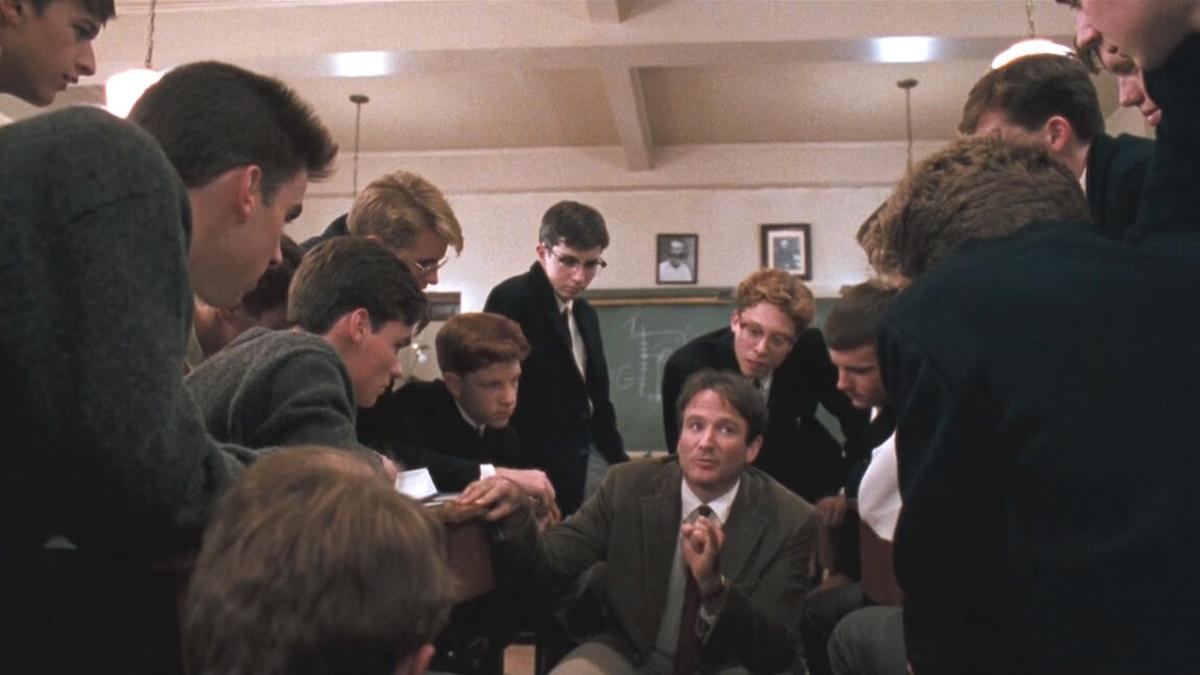Even a single poem, taught with care and received with wonder, can leave a lifelong imprint. | Photo: Still from the movie
I was ten when our primary teacher made our entire class learn “O Captain! My Captain!” by the American poet Walt Whitman for the school’s poetry competition. In the week leading up to the competition, we practiced endlessly, repeating every line. Our teacher didn’t just help us memorise the poem — she walked us through its meaning, broke down the difficult words, and brought its story to life. Somewhere along the way, the poem became more than just words.
Lessons beyond classrooms
This memory came back to me when I watched Dead Poets Society (1989). This coming-of-age movie starring Robin Williams, Ethan Hawke, Robert Sean shows an English teacher’s endeavor to help students look at life beyond the chase for prestigious careers. He sparks their interest in the beauty of love, life, and individual thought through poetry.
The Welton Academy, a prestigious and highly sought after preparatory school, helps students secure admissions to lucrative courses at Ivy League colleges. However, the students inspired by their English Teacher John Keating’s call to ‘seize the day’ and live life to the fullest, pursue their own passions. They organise the Dead Poets Society, in which they read poets like Byron, Shelley, Thoreau and more.
Reflection on the rehearsal
When I try to play it back in my mind, the memories of recitation of ‘O Captain!, My Captain’s parts are missing, as if time erased the in-between moments. I still remember one rehearsal where something just clicked within me — the way we recited it, full of emotion and intensity, made the scenes of the poem play out in my mind like a vivid film. The memories are in fragments — scattered and incomplete — like an old film reel that’s been taken out, damaged, and jumbled.
Unfortunately, after that we did not have any engagement with poetry at school. The poetry plays and short stories that were part of the English curriculum till I passed out of school was not given much emphasis which was not the case with other subjects. The situation has hardly changed. But as years had gone by, that one rehearsal stood with me and it had always left me with a sense of longing for such activities at school.
Reminiscing about the memories, John Keating’s explanation on why we should read poetry is more relevant now than ever. “We read and write poetry because we are members of the human race. And the human race is filled with passion,” he says.
In our society, professions such as medicine, law, business, and engineering are highly coveted, and Keating believes that those are noble pursuits and necessary to sustain life. It is, however, poetry, beauty, romance, and love that make us stay alive.
Dead Poets Society made me realise the lingering feeling that I had all along at that particular day of the rehearsal — a yearning for meaning, for expression, and for something more than a standard curriculum in our schools. In the pursuit of grades and careers, we often leave behind things that make us feel most alive.
Keating teaches us that passion, curiosity, and wonder are the very essence of life and the classroom is the place where hearts and minds are moulded. He wants us to observe, to reflect, to feel deeply about the world we live in.
In today’s world, in which productivity is worshipped and imagination often dismissed as impractical, the Dead Poets Society message remains more relevant than ever. It reminded me that even a single poem, taught with care and received with wonder, can leave a lifelong imprint. And perhaps, in remembering that, we can begin to reclaim a space for poetry, not just in classrooms, but in our everyday lives.
Published – April 17, 2025 09:19 pm IST
